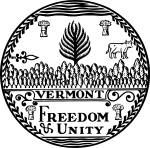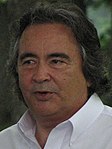
United States gubernatorial elections were held on November 2, 2004, in 11 states and two territories. There was no net gain in seats for either party, as Democrats picked up an open seat in Montana while defeating incumbent Craig Benson in New Hampshire, while Republicans defeated incumbent Joe Kernan in Indiana and won Missouri after Bob Holden lost in the primary. These elections coincided with the presidential election.

United States gubernatorial elections were held on November 7, 2006, in 36 states and two territories. The elections coincided with the midterm elections of the United States Senate and the United States House of Representatives.

The 2006 Vermont gubernatorial election took place on November 7. Incumbent Republican Governor Jim Douglas won re-election to a third term, defeating Democratic nominee Scudder Parker.

The 2006 Wyoming gubernatorial election took place on November 7, 2006. Incumbent Democratic Governor Dave Freudenthal won re-election in a landslide over Republican Ray Hunkins, becoming the first Democrat since 1910 to win every county in the state. To date this was the last time a Democrat was elected to statewide office in Wyoming, the last time a Democrat carried every county in the state, the last gubernatorial election in which a Democrat received more than 30% of the vote, the last statewide election in which a Democrat received more than 45% of the vote, and the last statewide election in which a Democrat won any county besides Teton, Albany, Laramie, or Sweetwater. As of 2024, Ray Hunkins is the last Republican gubernatorial nominee who was never elected Governor of Wyoming. This is the last time that Wyoming voted for and elected a Senate candidate and a gubernatorial candidate of different political parties.

United States gubernatorial elections were held on November 4, 2008, in 11 states and two territories. Prior to the election, eight of the total seats were held by Democrats and five by Republicans. Two governors were prohibited by term limits from seeking re-election in 2008. The only governorship to change party was the open seat in Missouri, which was won by a Democrat after being previously held by a Republican.

Gaye R. Symington is an American politician who is the former Speaker of the Vermont House of Representatives, the lower house of the Vermont General Assembly. She was the 2008 Democratic nominee for the 2008 Vermont gubernatorial election against incumbent Republican Governor Jim Douglas and Independent Anthony Pollina.

United States gubernatorial elections were held on November 7, 2000, in 11 states and two territories. The elections coincided with the presidential election. Democrats gained one seat by defeating an incumbent in West Virginia. As of 2024, this remains the last gubernatorial cycle in which a Democrat won in Indiana.

The 2008 Missouri gubernatorial election was held on November 4, 2008. Incumbent Republican Governor Matt Blunt decided to retire instead of seeking reelection to a second term in office. Democratic nominee Jay Nixon won the open seat, defeating Republican nominee Kenny Hulshof.

The 2008 Delaware gubernatorial election took place on November 4, 2008, coinciding with the United States presidential election. Democratic state Treasurer Jack Markell defeated Republican Bill Lee in a landslide, succeeding incumbent Ruth Ann Minner, also a Democrat, who was prevented from running for a third term.

The 2008 Indiana gubernatorial election was held on November 4, 2008. Incumbent Republican nominee Mitch Daniels was challenged by Democratic nominee Jill Long Thompson and Libertarian nominee Andy Horning. Daniels easily won reelection, defeating Long Thompson by over 17 points. Despite Daniels' landslide victory, Barack Obama narrowly carried Indiana in the concurrent presidential election; the only Democratic candidate to do so since 1964. As of 2024, this is the last election Marion County would vote Republican for governor and a statewide race.

The 2008 West Virginia gubernatorial election took place on November 4, 2008. Incumbent Governor Joe Manchin III was the Democratic nominee, challenged by Republican nominee Russ Weeks and Mountain Party candidate Jesse Johnson. Manchin won every county in the state and was reelected by the largest margin for any gubernatorial candidate in West Virginia's history. Manchin won by over 44%, even as Barack Obama, the Democratic presidential nominee, lost the state to John McCain in the presidential election. As of 2024, this is the last time that Doddridge County has voted for a Democratic candidate for statewide office.

The 2008 North Dakota gubernatorial election took place on 4 November 2008 for the post of Governor of North Dakota. Incumbent Republican governor John Hoeven was easily reelected again, defeating Democratic-NPL challenger Tim Mathern. The primaries took place on June 10, 2008. John Hoeven outperformed John McCain, the Republican presidential nominee, by about 21%. McCain defeated Democratic nominee Barack Obama 53%–45% in the concurrent presidential election.

The 2010 Vermont gubernatorial general election took place on November 2. Vermont and New Hampshire are the only two states where the governor serves a two-year term instead of four. Primary elections took place on August 24.

The 2010 Arkansas gubernatorial election took place on Tuesday, November 2, 2010. Incumbent Democratic governor Mike Beebe ran for re-election, and faced former state senator Jim Keet, whom he defeated in a landslide to win a second and final term as governor, despite the year being a Republican midterm wave year and Democratic senator Blanche Lincoln being unseated by a 21-point margin on the same ballot. Beebe's vote percentage and margin of victory was the highest of any Democratic gubernatorial candidate in the country that year.

The 2014 Vermont gubernatorial election took place on November 4, 2014, to elect the governor of Vermont, concurrently with elections to the United States Senate in other states and elections to the United States House of Representatives and various state and local elections. Incumbent Democratic governor Peter Shumlin ran for reelection to a third term in office against Republican businessman Scott Milne, Libertarian businessman Dan Feliciano and several other minor party and independent candidates.

The 2018 United States Senate election in Vermont was held November 6, 2018, alongside a gubernatorial election, U.S. House election, and other state and local elections. Incumbent independent Senator Bernie Sanders won re-election to a third term, defeating Republican nominee Lawrence Zupan. The primaries were held on August 14. This was one of two independent-held Senate seats up for election in a state that Hillary Clinton won in the 2016 presidential election.

United States gubernatorial elections were held on November 3, 2020, in 11 states and two territories. The previous gubernatorial elections for this group of states took place in 2016, except in New Hampshire and Vermont where governors only serve two-year terms. These two states elected their current governors in 2018. Nine state governors ran for reelection and all nine won, while Democrat Steve Bullock of Montana could not run again due to term limits and Republican Gary Herbert of Utah decided to retire at the end of his term.

The 2020 Vermont gubernatorial election was held on November 3, 2020, to elect the governor of Vermont. As Vermont does not impose term limits upon its governors, incumbent Republican governor Phil Scott was eligible to run for re-election to a third two-year term in office. On November 18, 2019, he confirmed that he was running for reelection, but did not yet publicly announce his campaign. On May 28, 2020, he officially announced his candidacy but stated that he would not campaign, maintain a campaign staff, or fundraise because of the state of emergency due to the COVID-19 pandemic in Vermont. The primary was held on August 11. Scott won re-election to a third term in a landslide, defeating Progressive and Democratic nominee, Lieutenant Governor David Zuckerman.

The 2022 Vermont gubernatorial election was held on November 8, 2022, to elect the governor of Vermont. Incumbent Republican governor Phil Scott won re-election to a fourth term in a landslide, defeating Democratic nominee Brenda Siegel.

The 2024 Vermont gubernatorial election was held on November 5, 2024, to elect the governor of Vermont, concurrently with the 2024 U.S. presidential election, as well as elections to the United States Senate and elections to the United States House of Representatives and various state and local elections. Incumbent Republican Governor Phil Scott won re-election to a fifth term, defeating the Democratic nominee, Vermont Commission on Women co-chair Esther Charlestin. Primary elections took place on August 13, 2024.

























